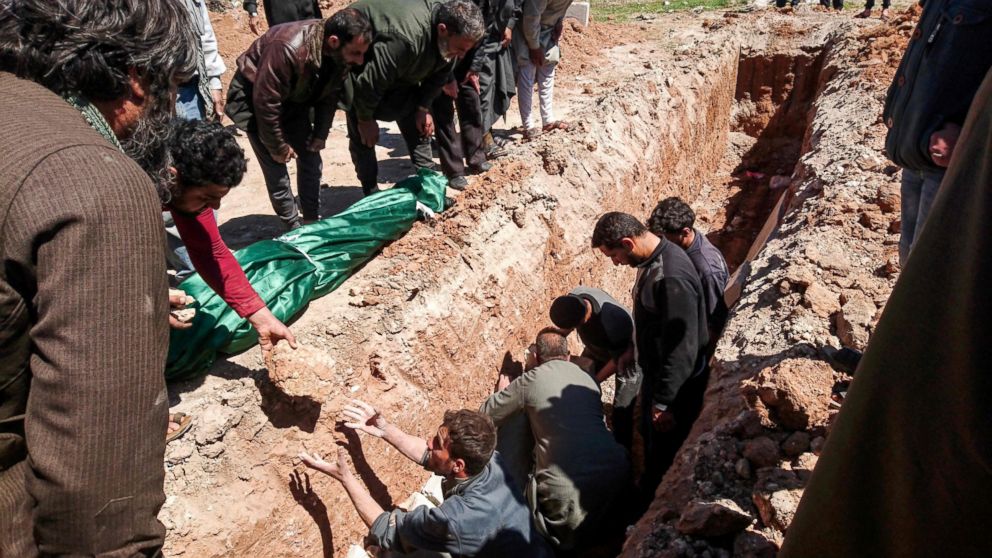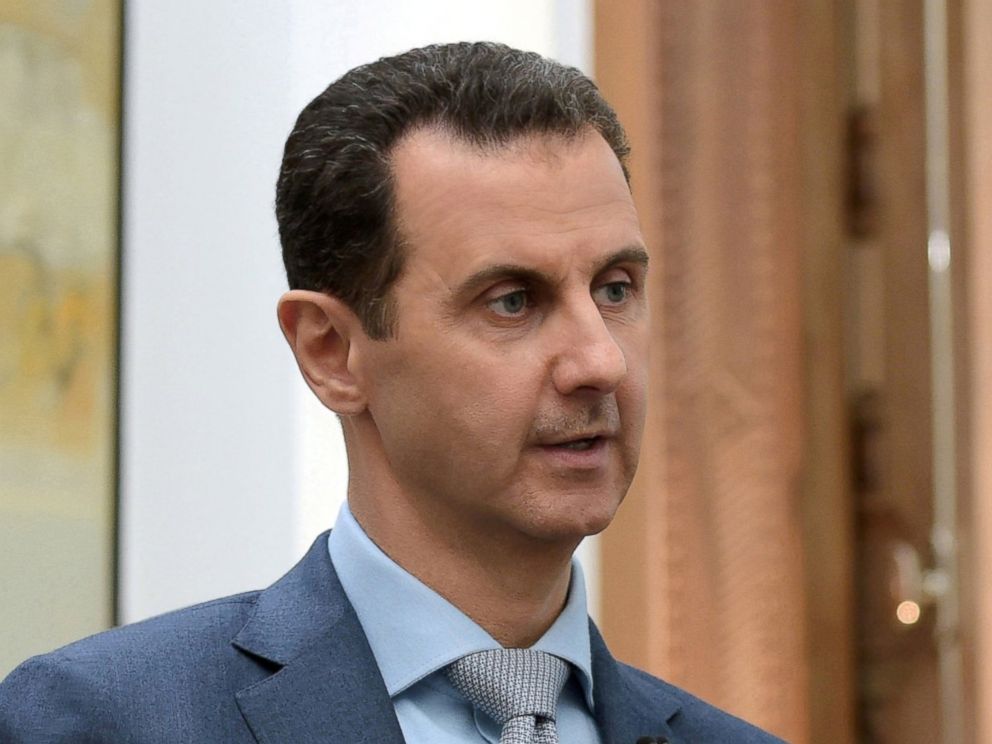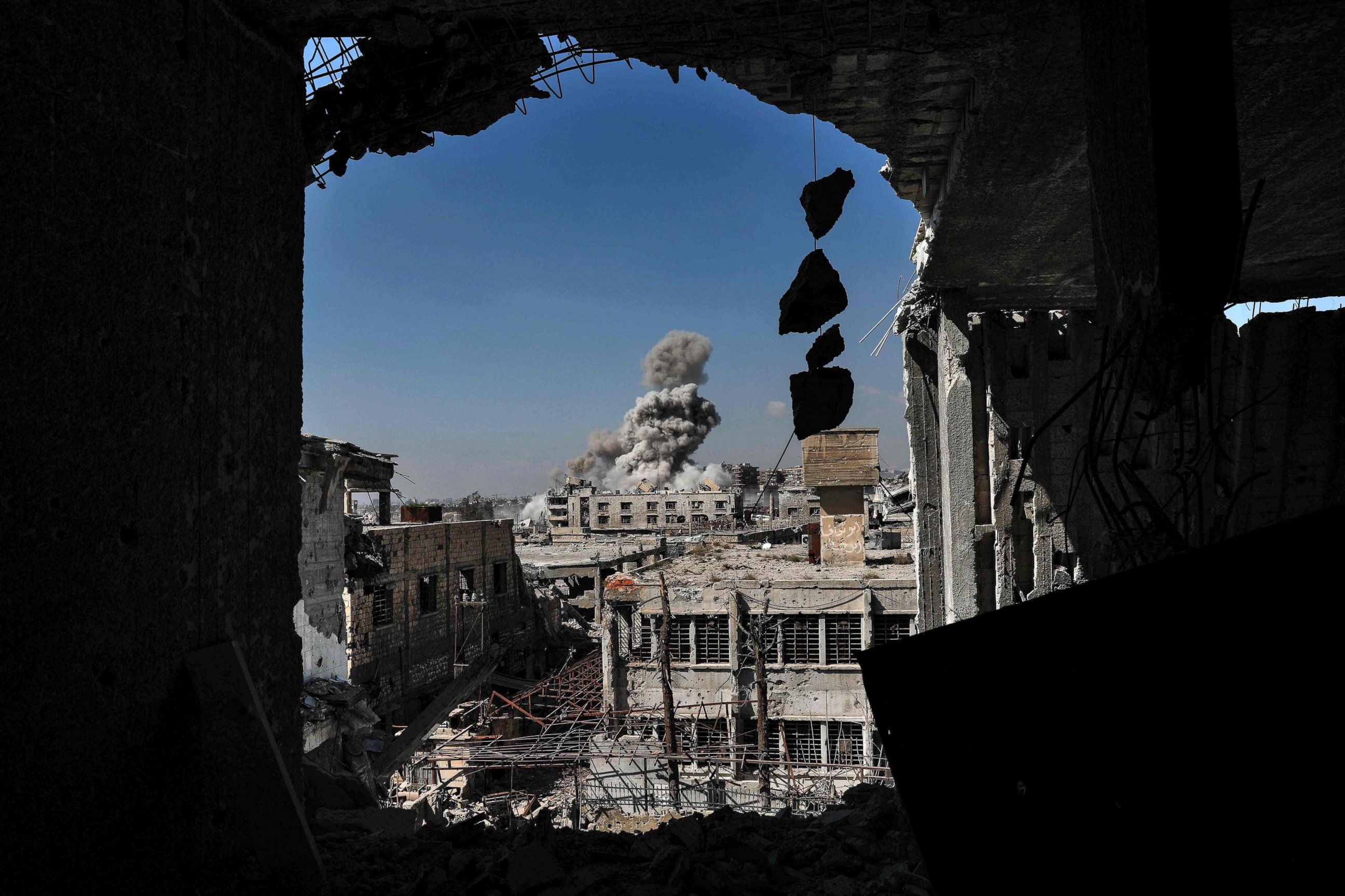President Trump's options for responding to Syria's chemical attack
There are diplomatic and military options on the table.
— -- Two days after a chemical attack by the regime of Syrian President Bashar al-Assad, the Trump administration is weighing its options for how to respond, saying there is no longer any doubt that Assad is responsible.
"Something should happen," said President Donald Trump aboard Air Force One today, as a U.S. official told ABC News the Pentagon and White House were reviewing military action in particular.
But for the “America First” president, who has repeatedly criticized the trillions of dollars the U.S. has spent on wars in the Middle East, what exactly will that "something" be?
If the goal is to punish Assad or prevent another chemical attack, there are military targets the U.S. could strike.
But there are a few other tools the administration could consider as well, according to Col. Steve Ganyard, an ABC News contributor and a retired Marine Corps fighter pilot who served as former deputy assistant secretary of state in the Bureau of Political-Military Affairs.
MILITARY
Trump has not yet decided on military action, according to the unnamed U.S. official who spoke to ABC News, but he would be presented with "an entire range" of military options, including the grounding of the Assad regime's air force and "stand-off strikes," fired from afar at military targets.
The idea would be to deter more chemical attacks by weakening Assad’s military. Send in sea-based cruise missiles or U.S.-manned aircraft to take out the Syrian air force, targeting its command and control facilities; strike at a forward operating base near a key city like Aleppo, or blow up a port, the official said.

When Syria first used chemical weapons in 2013, the Obama administration drew up a list of strike options, and the U.S. still has that intelligence, according to retired Vice Adm. Robert Harward, an ABC News contributor and the former deputy commander of U.S. Central Command who turned down the role of national security adviser after Michael Flynn's resignation.
There are three dangers here, experts say. First, it’s hard to calibrate -- just how much should you hit? On the one hand, the U.S. could risk things getting out of control as it picks sides and slides into a new war. What begins as airstrikes could become a fight with Iran and end up broadening the conflict, killing even more. On the other, the strikes have to be successful or else they don't send the right message.
"A) You're not sure you're going to accomplish your goal and B) you're not sure accomplishing your goal will have the strategic impact you desired," said Jon Alterman, the director of the Middle East Program at CSIS. "It could create a scenario where Assad says, 'They took a swing at me, and I'm still here.'"
Meanwhile, if the U.S. wants to target just chemical weapon sites, it will have to find them first.
“We don’t necessarily know where they are now,” said Ganyard, and if you attack without definitive targets, “you risk too much collateral damage.” Collateral damage means civilians killed, and there would be an even greater backlash for that.
DIPLOMATIC
Despite years of deadlock in the civil war, the administration could try putting more pressure on Assad by getting Russia to be the enforcer.
“Deliver a message that this has to stop, or we’re going to start blowing stuff up,” said Ganyard.
Harward agreed, adding diplomatic pressure has zero cost involved, less risk and less escalation.
Airstrikes aside, that has seemed to be the administration’s approach so far.
"The ball is now in Russia's court," a senior State Department official told ABC News Wednesday, adding that Secretary of State Rex Tillerson communicated that to Russian Foreign Minister Sergei Lavrov when he phoned him on Wednesday -- "the beginning of a conversation" that will continue next week when Tillerson travels to Moscow.
Tillerson has hinted at that increased pressure publicly, too.
"It is very important that the Russian government consider carefully their continued support for the Assad regime," he said Thursday, adding that "steps are underway" for Assad to be removed by the international community.

As Assad’s biggest backer and a critical source of military support, Russia is the one with the power here -- just as it was in 2013, when Russia reached a deal with the U.S. to eliminate Syria’s chemical weapon stockpiles. And there may be an opening, with increased global outrage over the attack.
"Russia is looking out for Russia," said Alterman, adding, "Russia is sensitive right now to the increased international scrutiny it has already gotten since their suspect direct involvement in U.S. elections and in European politics."
The problem is that a diplomatic message doesn’t always work. Even Russia did not get Syria to eliminate all of its stockpiles, as horrifically evidenced by this week’s attack. And it’s unclear if Russia would listen to the new administration to put renewed pressure on the brutal dictator they’ve long supported. The Kremlin denied Thursday that it had such control.
"It is not correct to say that Moscow can convince Mr. Assad to do whatever is wanted in Moscow. This is totally wrong," said Kremlin spokesperson Dmitry Peskov.
INTELLIGENCE
The administration could also use intelligence to try to bring down Assad, according to Ganyard.
Specifically, they could undermine his regime with a clandestine mission by Special Operations Forces or the CIA.

The downside there is the difficulty of such a mission. It’s hard to pull off and very dangerous.
It’s also a direct challenge to Russia and Iran, which would likely not stand idly by while the U.S. toppled a key ally in the Middle East.
ECONOMIC
The final tool available is sanctions. The U.S. could cut off Syria's financial ties to the outside world, freezing Assad’s assets and those of his top people and stopping them from moving money around the world.
"There is a whole array of economic sanctions you can impose although a lot have already been imposed," said Alterman. "You could try to squeeze their economy more. You could try to sanction individuals in the government more."
But again, it is difficult to calibrate this well. Push Assad too hard, and he could lash out in other ways, such as killing more civilians. And sanctions don’t always curb a rogue regime -- look at North Korea.
It’s also unclear how effective U.S. sanctions alone would be. Assad would still have his Russian and Iranian lifelines, so without a concerted global effort, the U.S. would not really threaten the regime’s funding.